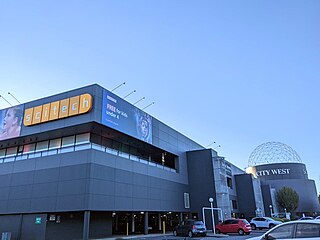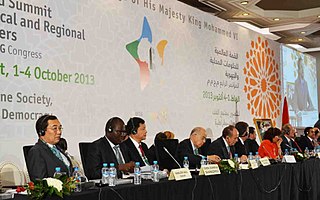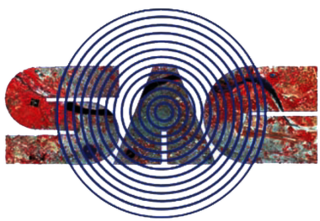Related Research Articles

Communication is usually understood as the transmission of information. Its precise definition is disputed and there are disagreements about whether unintentional or failed transmissions are included and whether communication does not only transmit meaning but also creates it. Models of communication are simplified overviews of its main components and their interaction. Many models include the idea that a source uses a coding system to express information in the form of a message. The message is sent through a channel to a receiver who has to decode it to understand it. The main field of inquiry investigating communication is called communication studies.

The United Nations Economic and Social Council is one of the six principal organs of the United Nations, responsible for coordinating the economic and social fields of the organization, specifically in regards to the fifteen specialised agencies, the eight functional commissions, and the five regional commissions under its jurisdiction.

A science museum is a museum devoted primarily to science. Older science museums tended to concentrate on static displays of objects related to natural history, paleontology, geology, industry and industrial machinery, etc. Modern trends in museology have broadened the range of subject matter and introduced many interactive exhibits. Modern science museums, increasingly referred to as 'science centres' or 'discovery centres', also feature technology.

The Pacific Community (PC), formerly the South Pacific Commission (SPC), is an international development organisation governed by 27 members, including 22 Pacific island countries and territories around the Pacific Ocean. The organisation's headquarters are in Nouméa, New Caledonia, and it has regional offices in Suva, Pohnpei, and Port Vila, as well as field staff in other locations in the Pacific. Its working languages are English and French. It primarily provides technical and scientific advice, and acts as a conduit for funding of development projects from donor nations. Unlike the slightly smaller Pacific Islands Forum, the SPC is not a trade bloc, and does not deal with military or security issues.

Auckland University of Technology is a university in New Zealand, formed on 1 January 2000 when a former technical college was granted university status. AUT is New Zealand's third largest university in terms of total student enrolment, with approximately 29,100 students enrolled across three campuses in Auckland. It has five faculties, and an additional three specialist locations: AUT Millennium, Warkworth Radio Astronomical Observatory and AUT Centre for Refugee Education.
In international relations, public diplomacy or people's diplomacy, broadly speaking, is any of the various government-sponsored efforts aimed at communicating directly with foreign publics to establish a dialogue designed to inform and influence with the aim of building support for the state's strategic objectives. These also include propaganda. As the international order has changed over the twentieth century, so has the practice of public diplomacy. Its practitioners use a variety of instruments and methods ranging from personal contact and media interviews to the Internet and educational exchanges.
The Centre for Environment Education (CEE) in India was established in August 1984 as a Centre of Excellence supported by the Ministry of Environment and Forests. The organisation works towards developing programmes and materials to increase awareness about the environment and sustainable development. The head office is located in Ahmedabad. The centre has 41 offices across India including regional cells in Bangalore (South), Guwahati, Lucknow (North), Ahmedabad (West) and Pune (Central); state offices in Delhi, Hyderabad, Raipur, Goa, Coimbatore; and several field offices. It has international offices in Australia and Sri Lanka.

Scitech is a not-for-profit company operating as the Scitech Science Centre, a permanent, interactive science museum which includes a planetarium in West Perth, Western Australia.
John Hartley, , FAHA,, FLSW, ICA Fellow, is an Australian academic. He was formerly Professor of Cultural Science and the Director of the Centre for Culture and Technology (CCAT) at Curtin University in Western Australia, and Professor of Journalism, Media and Cultural Studies at Cardiff University. He has published over twenty books about communication, journalism, media and cultural studies, many of which have been translated into other languages. Hartley continues with CCAT as an adjunct professor.

United Cities and Local Governments (UCLG) is an umbrella international organisation for cities, local and regional governments, and municipal associations throughout the world that is concerned with representing and defending the interests of local governments on the world stage.

The Space Applications Centre (SAC) is an institution of research in Ahmedabad under the aegis of the Indian Space Research Organisation (ISRO). It is one of the major centres of ISRO that is engaged in the research, development and demonstration of applications of space technology in the field of telecommunications, remote sensing, meteorology and satellite navigation. This includes research and development of on-board systems, ground systems and end user equipment hardware and software. SAC has three campuses, two of which are located at Ahmedabad and one at Delhi.
ASPAC may refer to:
Professor Gerard Goggin is an Australian media and communications researcher at the University of Sydney. He has produced award-winning research in disability and media policy alongside other contemporary works on digital technology and cultures.
This is a bibliography of works related the subject of tourism.
Science & Technology Australia (STA), formerly known as the Federation of Australian Scientific and Technological Societies (FASTS), is an organisation representing the interests of more than 90,000 Australian scientists and technologists, and promoting their views on a wide range of policy issues to the Australian Government, Australian industry, and the Australian community.
Vallampadugai Srinivasa Raghavan Arunachalam was an Indian scientist and former head of Defence Research & Development Organization (DRDO). He was the founder and chairman of CSTEP, a science and technology think tank.

The Guangdong Science Center is a major science center established in 2008 in Guangzhou, Guangdong, China.
Hildegard Katharina Vieregg is a museologist and museum professional, an educator, a university professor and lecturer, author, editor and administrator. She has contributed in important way to museums, to the International Council of Museums and to its International Committee for Museology. Her research interests include memorial sites, resistance against the Nazi totalitarian regime and museology as a science.

Indrajit Banerjee was an author on media and communication and the director of the Knowledge Societies Division at UNESCO.
The European Network of Science Centres and Museums (ECSITE), is a not-for-profit organisation initiated in 1989.
References
- ↑ Routledge handbook of public communication of science and technology (2nd ed.). Abingdon, Oxon: Routledge. 2014. p. 56. ISBN 9781135049478.
- ↑ Bruyas, Anne-Marie; Riccio, Michaela (2013). Science centres and science events : a science communication handbook. Milan: Springer. p. 55. ISBN 978-88-470-2556-1.
- ↑ Gascoigne, Toss; Schiele, Bernard; Leach, Joan; Riedlinger, Michelle; Massarani, Luisa; Lewenstein, Bruce V.; Broks, Peter (2020). Communicating science : a global perspective. Canberra, ACT, Australia. p. 752. ISBN 9781760463663.
{{cite book}}: CS1 maint: location missing publisher (link)